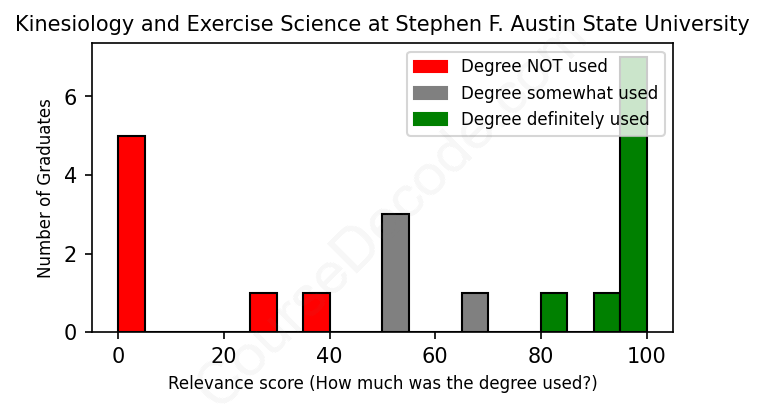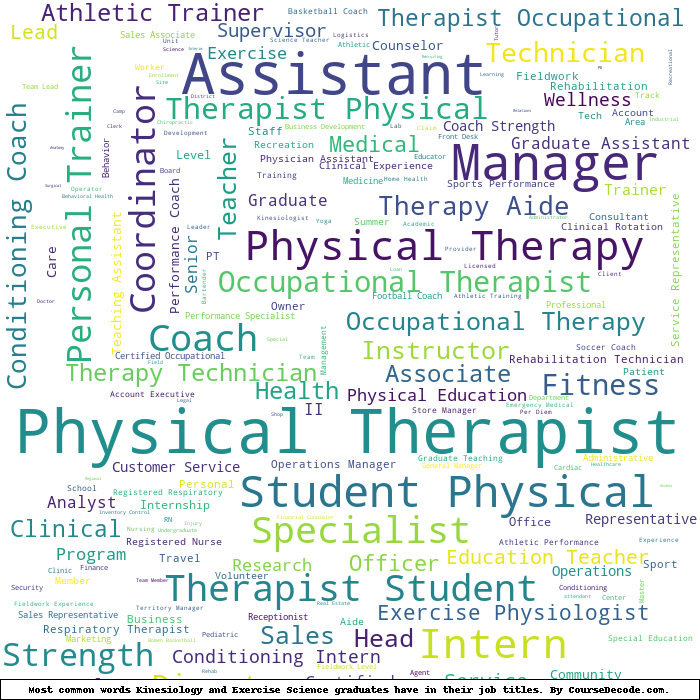
First, some facts. Of the Kinesiology and Exercise Science graduates from Stephen F. Austin State University we've analyzed , here's how many have used (or NOT used) their degree in their career:

These are estimates based on AI analysis of 20 LinkedIn profiles (see below).
The verdict? Below average. Overall, with an average relevance score of 58%, Kinesiology and Exercise Science graduates from Stephen F. Austin State University have a lower likelihood (-9%) of finding work in this field compared to the average graduate across all fields:
And for comparison, here's the chart for all profiles we've looked at across all degrees.
Also, after graduating, 40% of these graduates have pursued further education other than another Bachelor's degree (such as a Masters degree or other), compared to the average across all profiles of 35%. This suggests you may need more than just a Bachelors degree to be competitive as a Kinesiology and Exercise Science graduate.
See the details:
|
Relevance score: 69% We think this person has gone into a career only somewhat relevant to their degree. We think this person has gone into a career only somewhat relevant to their degree.
DEGREE INFOGraduated in 2013 from Stephen F. Austin State University with a Bachelor of Science (BS) in Kinesiology and Exercise Science. Also pursued further education since (see below). JOB HISTORY SINCE GRADUATIONGraduate Assistant Stephen F. Austin State University Aug 2013 - May 2015 Sports Performance Coach  Fairchild Sports Performance, Inc. Sep 2015 - Sep 2019 Recreation and Wellness Department Administrator  Windham School District Oct 2019 - Jan 2024 Principal Wellness Administrator  Texas Department of Family and Protective Services Feb 2024 - Present FURTHER DEGREES DONE SINCE GRADUATINGMaster of Science - MSStephen F. Austin State University 2013 - 2015 ABOUTNo information provided. |
The top 10 most common jobs done by the graduates we've analyzed (ranked most common to least) are:
After taking a look at the various jobs that grads from Stephen F. Austin State University with a degree in Kinesiology and Exercise Science have landed, it seems like there are a few common paths they tend to follow. Many of them have found roles as Physical Education Teachers, Athletic Trainers, and coaches, which make perfect sense since those jobs are basically all about applying the principles of kinesiology and exercise science. For instance, roles like Physical Education Teacher or Co-Head Athletic Trainer directly use the knowledge from the degree, helping students or athletes improve their physical skills and health. Others, like Occupational Therapists, also fully utilize skills related to human movement and rehabilitation. These positions definitely align well with what they studied.
However, not all job choices have kept them close to their roots in kinesiology and exercise science. A noticeable number of graduates have ventured into fields like sales, customer service, and various administrative roles that have little to do with their studies. For example, roles like Senior Sales Consultant at a hotel or positions in technical support at Apple don’t tap into the expertise they'd gained during their degree. It seems that while many graduates are successfully applying their Kinesiology and Exercise Science knowledge in relevant fields, a significant number have chosen careers that diverge from that path, which raises questions about how well the degree is translating into jobs directly related to their studies. Overall, it’s a bit of a mixed bag!
Here is a visual representation of the most common words in job titles for Kinesiology and Exercise Science graduates (this is across all Kinesiology and Exercise Science graduates we've analyzed, not just those who went to Stephen F. Austin State University):

When looking at graduates from the Kinesiology and Exercise Science program at Stephen F. Austin State University, it's pretty clear that a lot of them start off in roles that are directly related to health, fitness, and education. Many land their first jobs as physical education teachers, coaches, or athletic trainers right out of college, which is awesome because it shows they're putting their degree to good use. For instance, several graduates became physical education teachers almost immediately after graduation, indicating that schools value their expertise in promoting physical activity and wellness. Others have taken on roles like athletic trainers in high schools, which suggests a strong connection between their studies and their initial employment choices.
Fast forward 5 to 10 years later, and you see a mixed bag of career paths. A good number of graduates are still in the health and fitness sector, transitioning into more specialized roles like occupational or physical therapists, or moving into sports performance coaching. However, it's noteworthy that some have veered away from kinesiology-related fields altogether, with a few ending up in sales or customer service positions, which while far from their initial career intentions, still highlight their adaptability. This pattern hints at both the diverse opportunities Kinesiology graduates can explore and some challenges in staying within their field long-term. Overall, while many have built solid careers connected to their degree, there's also evidence of some wandering into unrelated territories as they seek job stability and growth opportunities.
Getting a Bachelor’s degree in Kinesiology and Exercise Science at Stephen F. Austin State University can be a bit of a mixed bag, but I’d say it’s pretty average in terms of difficulty compared to other degrees. You’ll definitely have some core classes that are more challenging, especially if science isn’t your strong suit—think anatomy and physiology, which can get pretty deep. But overall, if you're interested in the subject and stay organized, you should be able to handle it pretty well. There are also plenty of hands-on labs and activities that make learning more enjoyable, which can help balance out the tougher coursework. So if you’re into fitness and health, it could be a fun ride!
Most commonly, in the LinkedIn profiles we've looked at, it takes people 4 years to finish a Bachelor degree in Kinesiology and Exercise Science.
Based on the job paths of these Kinesiology and Exercise Science graduates from Stephen F. Austin State University, it seems like their earning potential varies quite a bit. Some graduates, like those working in sales roles at Dell or advising at Apple, likely have a decent income, especially considering the tech industry's typically higher salaries. However, others, especially those in teaching and coaching positions, might not be bringing in as much cash since education jobs often come with lower pay rates. Additionally, entry-level roles like medical assistants or customer service reps likely don't pay as well, especially when they're just starting out. Overall, it looks like some are doing well, but others might be just getting by or working up to better pay as they gain experience.
Here is a visual representation of the most common words seen in the "about" section of LinkedIn profiles who have a Bachelor degree in Kinesiology and Exercise Science (this is across all Kinesiology and Exercise Science graduates we've analyzed, not just those who went to Stephen F. Austin State University). This may or may not be useful:

Here are all colleges offering a Bachelor degree in Kinesiology and Exercise Science (ordered by the average relevance score of their Kinesiology and Exercise Science graduates, best to worst) where we have analyzed at least 10 of their graduates: